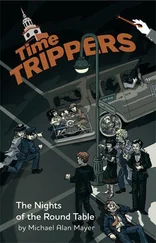One summer, the word went round the whole of the Danish kingdom that King Harald Bluetooth had embraced the new religion. In his youth, he had done so tentatively, but had soon regretted his decision and recanted; this time, however, he had adopted it seriously. For King Harald was by now an old man, and had for some years been tormented by terrible pains in his back, so that he had almost lost his pleasure in ale and women; but wise bishops, sent by the Emperor himself, had rubbed him with bear’s-grease, blessed and made potent with the names of apostles, and had wrapped him in sheepskins and given him holy herbal water to drink instead of ale, and had made the sign of the cross between his shoulders and exorcised many devils out of him, until at last his aches and pains had departed; and so the King became a Christian.
Thereupon, the holy men had assured him that still worse torments would come to plague him if he should ever again offer sacrifice, or show himself in any way unzealous in the new religion. So King Harald (as soon as he had become active again, and found himself capable of fulfilling his obligations towards a young Moroccan slave-girl, whom Olof of the Precious Stones, the King of Cork, had sent him as a goodwill present), issued a proclamation that all his subjects should get themselves christened without delay; and, although such an order sounded strangely from the lips of one who was himself descended from Odin, still many obeyed his command, for he had ruled long and prosperously, so that his word counted for much in the land. He meted out especially severe punishments to anyone who had been guilty of violence against any priest; so that the number of priests in Skania now began to multiply greatly, and churches rose upon the plain, and the old gods fell into disuse, except in times of peril at sea or of cattle-plague.
In Göinge, however, the King’s proclamation was the occasion of much merriment. The people of the border forests were blessed with a readier sense of fun than the sober dwellers of the plain, and nothing made them laugh so much as a royal proclamation. For in the border country, few men’s authority extended beyond the limit of their right arm, and from Jellinge to Göinge was a long march even for the mightiest of kings to undertake. In the old days, in the time of Harald Hildetand and Ivar of the Broad Embrace, and even before that, kings had been wont to come to Göinge to hunt the wild ox in the great forests there, but seldom on any other errand. But since those times, the wild ox had died out, and the king’s visits had ceased; so that nowadays, if any king was bold enough to murmur a complaint that the people of those parts were turbulent or that they paid insufficient taxes, and threatened to journey thither himself to remedy matters, the answer would be sent to him that there were, unfortunately, no wild oxen to be seen in the district nowadays, but that as soon as any should appear he would at once be informed, and a royal welcome would be prepared for him. Accordingly, it had for long been a saying among the border people that no king would be seen in their country until the wild oxen returned.
So in Göinge, things remained as they had always been, and Christianity made no headway there. Such priests as did venture into those parts were sold over the border as in the old days; though some of the Göings were of the opinion that it would be better to kill them on the spot, and start a good war against the skinflints of Sunnerbo and Allbo, for the Smalanders gave such poor prices for priests nowadays that it was hardly worth a man’s trouble to lead them to market.
PART ONE
CHAPTER ONE
Concerning Thane Toste and his household
Along the coast the people lived together in villages, partly to be sure of food, that they might not depend entirely on the luck of their own catch, and partly for greater security; for ships rounding the Skanian peninsula often sent marauding parties ashore, both in the spring, to replenish cheaply their stock of fresh meat for the westward voyage, and in the winter, if they were returning empty-handed from unsuccessful wars. Horns would be blown during the night when raiders were thought to have landed, so that the neighbours might come to the assistance of those attacked; and the stay-at-homes of a good village would occasionally even capture a ship or two for themselves, from strangers who had not been sufficiently prudent, and so have fine prizes to show the wanderers of the village when the long ships came home for their winter rest.
But men who were wealthy and proud, and who owned their own ships, often found it irksome to have neighbours on their doorstep, and preferred to live apart; for, even when they were at sea, they could keep their homes defended by good warriors whom they paid to stay in their houses and guard them. In the region of the Mound, there were many such great lords, and the rich thanes of that district had the reputation of being the proudest in all the Danish kingdom. When they were at home, they readily picked quarrels with one another, although their homesteads lay well spaced apart; but often they were abroad, for they had been used from their childhood to look out over the sea and to regard it as their own private pasture, where any whom they found trespassing would have to answer for it.
In these parts there lived a thane called Toste, a worthy man and a great sailor who, although he was advanced in years, still commanded his ship and set out each summer for foreign shores. He had kinsmen in Limerick in Ireland, among the Vikings who had settled there, and he sailed west each year to trade with them and to help their chieftain, a descendant of Ragnar of the Hairy Breeks, to collect tribute from the Irish and from their monasteries and churches. Of late, however, things had begun to go less well for the Vikings in Ireland, ever since Muirkjartach of the Leathern Coats, the King of Connaught, had marched round the island with his shield-arm towards the sea as a sign of defiance. For the natives now defended themselves better than before and followed their kings more willingly, so that it had become a difficult business to extort tribute from them; and even the monasteries and churches, that had previously been easy to plunder, had now built high stone towers to which the priests betook themselves, and from which they could not be driven by fire or by force of arms. In view of all this, many of Toste’s followers were now of the opinion that it might be more profitable to go a-viking in England or France, where times were good and more might be won with less effort; but Toste preferred to do as he had been used to do, thinking himself too old to start journeying to countries where he might not feel so well at home.
His wife was called Asa. She came from the border forest and had a ready tongue, besides being somewhat smart of temper, so that Toste was sometimes heard to remark that he could not see much evidence of time having smoothed out the wrinkles in her nature, as it was said to do. But she was a skilful housewife, and took good care of the farm when Toste was away. She had borne him five sons and three daughters; but their sons had not met with the best of luck. The eldest of them had come to grief at a wedding, when, merry with ale, he had attempted to prove that he could ride bareback on a bull; and the next one had been washed overboard on his first voyage. But the unluckiest of all had been their fourth son, who was called Are; for, one summer, when he was nineteen years old, he had got two of their neighbours’ wives with child while their husbands were abroad, which had been the instance of much trouble and sly jibing, and had put Toste to considerable expense when the husbands returned home. This dejected Are’s spirits and made him shy; then he killed a man who had chaffed him overlong for his dexterity, and had to flee the country. It was rumoured that he had sold himself to Swedish merchants and had sailed with them to the east, so that he might meet no more people who knew of his misfortune, but nothing had been heard of him since. Asa, however, had dreamed of a black horse with blood on its shoulders, and knew by this that he was dead.
Читать дальше












